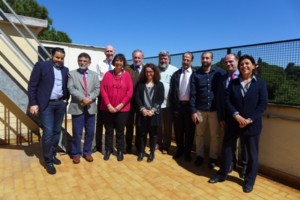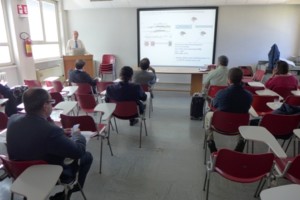On April 28-29, 2017 the advanced course on “CHALLENGES IN CHRONIC LYMPHOCYTIC LEUKEMIA AND NON-HODGKIN LYMPHOMA TODAY” took place at the Center of Hematology of the “Sapienza” University in Rome (Program Challenges in Chronic Lymphocytic Leukemia).
This educational program for hematologists from Saudi Arabia was made possible by Roche Saudi. The purpose of the course was to underline the advancements that have taken place in the diagnosis, classification, prognosis and treatment of patients with chronic lymphocytic leukemia (CLL) and non-Hodgkin lymphoma (NHL). This has led to progressive and impressive advancements in our knowledge of the biology of the diseases and, in turn, to profound changes in the management of patients suffering from these diseases.
 The faculty – represented by 11 well recognized experts (from Rome, Bologna, Cuneo, Novara) in the different areas covered – discussed the advancements witnessed over the years in the overall management of patients with CLL and NHL. Attention was indeed paid on the correct diagnostic work-up and differential diagnosis with akin conditions, on the last version of the WHO classification, on the biologically-based prognostic stratification possible today, on their impact and clinical implications, and on the different therapeutic scenarios available and in development.
The faculty – represented by 11 well recognized experts (from Rome, Bologna, Cuneo, Novara) in the different areas covered – discussed the advancements witnessed over the years in the overall management of patients with CLL and NHL. Attention was indeed paid on the correct diagnostic work-up and differential diagnosis with akin conditions, on the last version of the WHO classification, on the biologically-based prognostic stratification possible today, on their impact and clinical implications, and on the different therapeutic scenarios available and in development.
The advent of always more sophisticated technologies and what they can permit today towards a further understanding of the biology of the diseases and the possible clinical implications were also presented and discussed. Examples are represented by minimal residual disease (MRD) monitoring with conventional approaches (flow cytometry and PCR) and developing technologies (digital PCR, next generation sequencing). In addition, the potential role and impact of complex karyotype and liquid biopsy investigations was discussed.
As in other similar courses conducted at our center, ample time was dedicated to interactive discussions between the participants and the faculty, in a very informal and proactive manner, in order also to compare similarities and differences in management in our countries, with an eye also to the situation in other parts of the world.
 Particular attention was given to the issues of accessibility to technologies and drugs, at a time when the lab is always more impacting in clinical decisions and when many new biologically-driven drugs have shown activity in NHL and, to a further extent, in CLL. The problem of sustainability was also actively discussed. In this respect, the issue of treatment algorithms becomes always more important, at a time when BCR antagonists have been approved also in the first line setting.
Particular attention was given to the issues of accessibility to technologies and drugs, at a time when the lab is always more impacting in clinical decisions and when many new biologically-driven drugs have shown activity in NHL and, to a further extent, in CLL. The problem of sustainability was also actively discussed. In this respect, the issue of treatment algorithms becomes always more important, at a time when BCR antagonists have been approved also in the first line setting.
Robin Foà
